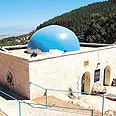
Secular Jews join religious trends
Poll shows secular Jews embrace religion in unconventional ways, rise in 'trend' of secular Jews visiting the tombs of the righteous
The data was collected by two simultaneous methods: A telephone survey of the older community, and an internet poll posted on Ynet which had over 40 thousand participants.
Thirty-two percent of those surveyed answered positively when asked whether they have visited the tombs of the righteous; 11 percent of those who answered “yes” were secular, while the rest were traditional (31 percent) and religious (82 percent) Jews.
Rafi Smith, of the Smith Institute, said more Israelis aged 29-years-old and under have visited the graves than Israelis aged 50 and up.
The poll also showed that seven out of 10 Israelis believe in the existence of God, and six out of 10 believe it was God who created the world in which we live today.
The data points to a phenomenon whereby Israelis embrace Judaism in unconventional ways, as only nine percent of the respondents said they visit a synagogue on a daily basis, and 33 percent said they go to temple on Sabbath and holidays; 31 percent said they go to shul only for “events and bar-mitzvahs.”
According to Holy Sites Authority Director Yosef Shwinger, the number of secular Israelis who frequent the tombs is closer to one out of every four or five people, adding that the most popular sites are the graves of Rabbi Shimon Bar-Yochai, Rabbi Meir Baal HaNess and Rabbi Yonatan Ben-Uziel.
No one to count on
When asked why he thought so many secular Jews prefer visiting the tombs of the righteous over more common, day-to-day religious acts such as visiting the synagogue, he said he felt there was a religious awakening occurring that he couldn’t define.
“It’s not about repentance, but more about accepting the religion as something obvious and less foreign, estranged, dark and scary. There is a sort of acceptance that the religion is not such a terrible thing, as it has been illustrated in the past, but the opposite. The religion on helps and contributes to life,” Shwinger said.
Haredi journalist Yisrael Glis had a different answer. While writing a book on sacred places in Israel, Glis asked the secular Jews he met at different sites what made them visit such places.
According to him, he was told that it was because of “an inner feeling of despair”, and that people felt they couldn’t count on their leaders saying, ‘we can’t count on anyone but our Father in heaven”.
Dr. Nissim Leon, a sociologist from Bar Ilan University, also refers to that slogan as a growing mood amongst many. “It’s a motto that also explains why people lean on the same god. People are really saying that it’s the only thing left that we can count on,” Leon said.
He explained people’s yearning for “something to count on” by saying, “God is something invisible. What other invisible figures do we have? The image of Rabbi Nachman of Breslov. It’s the same thing.”










